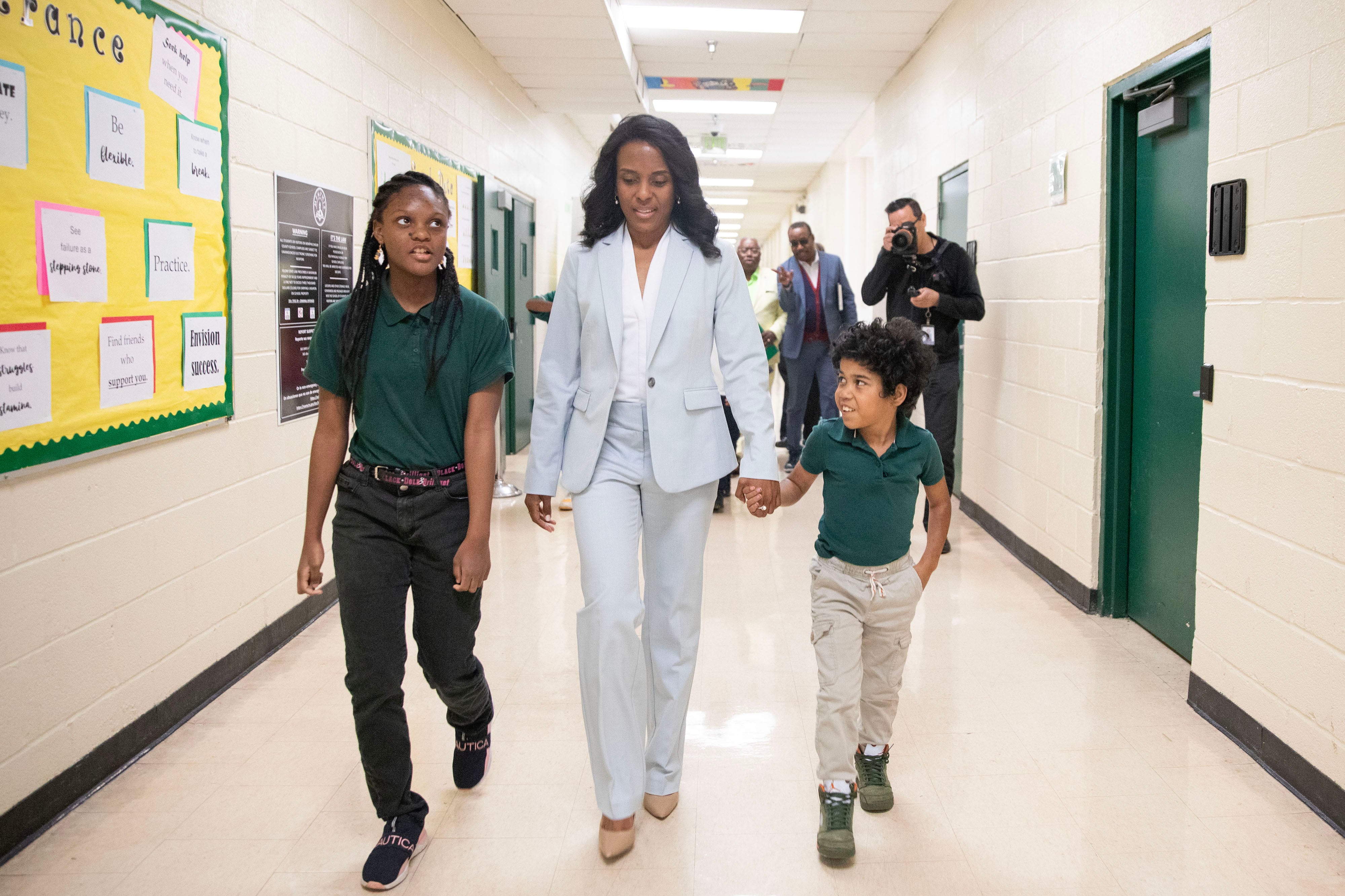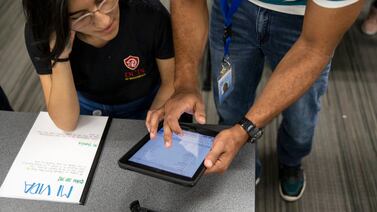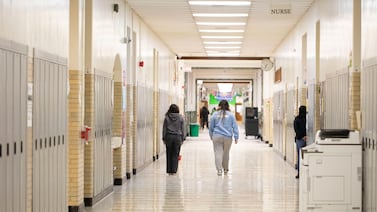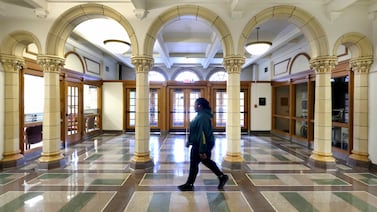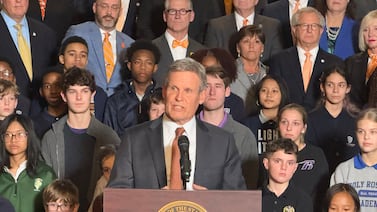Sign up for Chalkbeat Tennessee’s free daily newsletter to keep up with Memphis-Shelby County Schools and statewide education policy.
This week, more than 100,000 students in Memphis-Shelby County Schools, the state’s largest school district, are putting summer break behind them and marching into a new academic year.
And a lot of new awaits them.
There’s new leadership for the district, including the superintendent, Marie Feagins, beginning her first full school year, and a school board that will have four new members, following last week’s elections.
New budget priorities — and realities — will create changes in the district’s workforce and in the classroom, reflecting the end of federal pandemic relief funds.
And expect more pressure from state officials to change the way education is delivered to children in Memphis, including the creation of a university-led school district and a renewed push for universal school vouchers.
Here are five things to watch for in 2024-25.
Superintendent Marie Feagins begins her first full year
Marie Feagins, who took over as superintendent in April after a nearly two-year search process, has made sweeping changes already to direct more of the district’s resources into the classroom. One of them was cutting more than 1,100 non-classroom positions and creating opportunities for those employees to apply for school-based jobs to help alleviate a teacher shortage. The goal, she said, is to get more student support housed directly in schools, not dropping in occasionally from the central office.
Look for more shakeups as Feagins leads MSCS in adapting to the expiration of federal pandemic relief funds and implementing more academic accountability measures. Her team is working on a strategic plan that incorporates efforts to improve the district’s academic performance and students’ learning environments.
Feagins has laid out plans to revamp school turnaround work and hired a longtime administrator to oversee the district’s lowest performing schools.
Meanwhile, she has tried to tackle cost inefficiencies that siphon money out of the classroom, including an “abuse” of overtime that she said has cost the district $1 million.
Feagins told the school board last week to expect air-conditioning issues in schools as students return. “As we know, we have incredibly aged buildings,” she said.
As for teacher shortages, the district has held 10 hiring blitzes attended by more than a thousand people in recent months. As of last week, its 250 instructional vacancies were “significantly lower than we were as a district last year,” Feagins said. Most are for special education and English language learners.
Memphis-Shelby County Schools board will get new members
Four new members will soon join the nine-member MSCS board after elections for five seats on Aug. 1.
Leaving soon is Chairperson Althea Greene, who lost her bid for reelection to Natalie McKinney. Choosing a new chairperson will be the new board’s first order of business.
The board will be charged with navigating changes under the leadership of the new superintendent, and holding her accountable. Already, members have pushed Feagins for better communication about her initiatives, including the job cuts.
The board is in the process of rebuilding relationships and public trust after a protracted superintendent search exposed divisions and ignited conflicts among board members.
Money in place to improve facilities and student outcomes
Feagins’ $1.8 billion budget, approved by the board in June, prioritized alleviating the teacher shortage. But it also included key items aimed at improving academic performance in a district where many students struggle with economic challenges and are forced to learn in aging, dilapidated buildings. The potential impact of that spending will become clearer this year.
The budget includes $96 million to improve facilities to create safer learning spaces for students, and $14.6 million to expand after-school programs and activities. Bus routes for afterschool activities are also included — an important step in a city where the public bus system regularly faces cutbacks. Around 8,000 students are expected to participate.
The spending plan also includes $21.8 million for targeted coaching and tutoring services to help students improve on the Tennessee Comprehensive Assessment Program, known as TCAP, and end-of-course tests.
MSCS students’ TCAP performance improved in 2024, with 22.4% of students meeting or exceeding expectations on the reading test, compared with 20.7% in 2023. In 2021, the figure was just 13%.
The percentage of third, fourth, and fifth graders who scored proficient in reading increased from 23.3% in 2023 to 26% in 2024. The improvement in those levels is important, because third grade is when students face the prospect of being held back or sent to summer school if they don’t meet or show significant progress toward meeting TCAP reading standards.
State forces more changes in Memphis education
In March, state Rep. Mark White, a Memphis Republican who chairs the House Education Administration Committee, said he would file legislation to allow Gov. Bill Lee to appoint up to six members to the MSCS board. That plan was shelved in the face of community opposition.
But lawmakers and state officials continue to pursue policies that extend the state’s influence over Memphis schools.
A new law allowed the University of Memphis, which enrolls around 1,050 students in its University Schools, to carve out its own K-12 school district from the public schools that it has operated under a long-running contract with MSCS.
That change will affect MSCS, because the students who attend the University Schools have regularly posted some of the district’s highest test scores.
The state also changed the criteria for its first-ever A-F grades for schools, emphasizing academic proficiency over growth, dismissing opposition from many local public school leaders. In December 2023, of the 5% of Tennessee schools that received F’s, half were in MSCS — where most of the students are low-income and struggling academically. We’re watching to see how the schools fare in 2024.
Expanded school voucher proposal will be back
This year, Gov. Bill Lee’s efforts to pass a universal school voucher law failed in the legislature due to opposition from rural lawmakers in his own party. He has vowed to revive the fight next year, and the recent primary elections delivered a mix of wins and losses for voucher supporters.
Some Memphis families already have access to vouchers under the state’s existing Education Savings Account voucher program, which is available in three urban areas. Lee wants to expand voucher access statewide, regardless of family income.
But the benefits of private school vouchers are still unclear. Results from the Education Savings Account program showed that most students who participated in 2022-23 posted lower scores on state tests than their counterparts in public schools. This year, recipients in three counties made modest gains, but their performance still trailed their peers in public schools.
Tonyaa Weathersbee is the former bureau chief for Chalkbeat Tennessee. Reach her at tonyaaweathersbee@yahoo.com.

